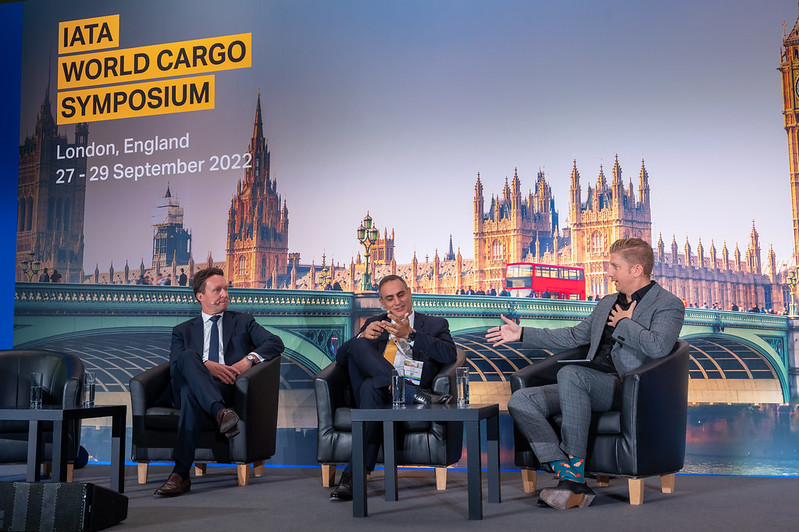IATA WCS: take action to drive change
06 / 10 / 2022

Michael Steen (left) with Andres Bianchi (centre) and Brendan Sullivan. Photo: IATA
The take home message from the IATA World Cargo Symposium (WCS) was clear – the industry has the tools to enact positive change but it must not hesitate.
At the Closing Plenary of the conference, Michael Steen, cargo advisory council chair and chief executive Atlas Air, reflected on the general consensus that the industry has never been more globally relevant.
Clear priorities and targets are needed to drive meaningful change and tackle challenges, said Steen.
Safety first
Using the goal to make lithium batteries safer as an example, he said: “In creating a safe environment for transporting lithium batteries, you could on the one hand say common sense is needed to make those decisions.
“Well common sense doesn’t mean the same thing in various locations around the world.”
Steen said given the pace of action is different globally, we need to make sure we understand what the priorities are and that we align around them.
Steen and fellow panellist, Andres Bianchi, – Cargo Advisory Council vice chair and LATAM head of cargo, agreed that safety should not be sidelined especially with the new challenges that industry growth brings. Steen said: “We can’t wait for a catastrophic event. We have to take action.”
Driving digitalisation
Looking at digitalisation, Steen said: “I’ve spent 25 plus years in this industry and we’re still dealing with some of the things we were talking about 25 years ago.
“That is not a good testament to the pace of change in our industry. So, the critical thing is we need to drive that change.”
On the subject of sustainability, he added that “regulations are not going to drive success” alone.
“What’s really important, and where I see some real momentum now is we are willing to have this discussion, we are willing to set objectives and are willing to hold ourselves accountable (for action points).”
Talking about progressing sustainability, digitalisation and safety and sustainability work within the industry, Bianchi noted: “We are asking the right questions, but we’re having trouble getting to the right answers.”
He said the industry needs to reverse “this cycle of inaction”.
“The challenge for the next few years is to really drive change, but make that change concrete.”
Steen said that investing in talent and retention will be a boost for digitalisation: “New talent offers a massive opportunity. They will seek out new technology.”
Bianchi added: “Standards are critical for the acceleration of digitalisation.”
How to go green
Brendan Sullivan, global head of cargo at IATA, said: “The air cargo industry is in a better place than it was in 2019, but there are some headwinds, there are some challenges.”
“It’s very clear that (the industry) can align at the top level of sustainability – net zero by 2050. What’s harder is getting to those tangible drivers”
Bianchi said that small changes matter in the race for sustainability as well as big ones.
Steen noted that collaboration is important to achieve targets, for example between air cargo stakeholders and energy stakeholders in the acquisition and adoption of Sustainable Aviation Fuel (SAF). IATA needs to help support this.
Both agreed the industry should leverage the strong position of air cargo and take immediate action on time-critical issues.
Steen said: “We need to see progress. We have never been in a better position. We are critical to the economy. We have momentum.”
Bianchi added: “We have never been in a better place to make the industry better, safer and more sustainable.”
Collaboration is key
Gathering to speak on the subject of “Maintaining Momentum, building resilience though partnerships” was Steven Polmans, chairman of the board, TIACA, Dr Stéphane Graber, director general, FIATA, and Brendan Sullivan, global head of cargo, IATA.
Sullivan pointed out that at the top level it’s easy to align on the main priorities.
Polmans stressed that some issues need to be tackled with a cross-industry approach, but not all initiatives need to be duplicated.
Graber said FIATA’s top priorities are safety, security, nurturing talent and sustainability. “Collaboration is one of the most challenging things we have to do. Understanding what is critical for the industries we represent. Inclusion is an important aspect of collaboration.”
In response to a question from session moderator Celine Hourcade, founder and chief executive at Change Horizon, on whether the industry organisations are competitive with each other, Sullivan said that “we do share and communicate information that will be beneficial”.
Graber added that competition is not what is expected between the organisations.
On the subject of one of the biggest air cargo challenges – attracting new talent to the industry, Sullivan said: “Air cargo is not attractive, but digital innovation is.”
He said that as the latter is a major industry focus, it should be used as a leverage point for building up new industry talent.
Graber added: “By bringing in the right people we can create a more attractive industry.”














